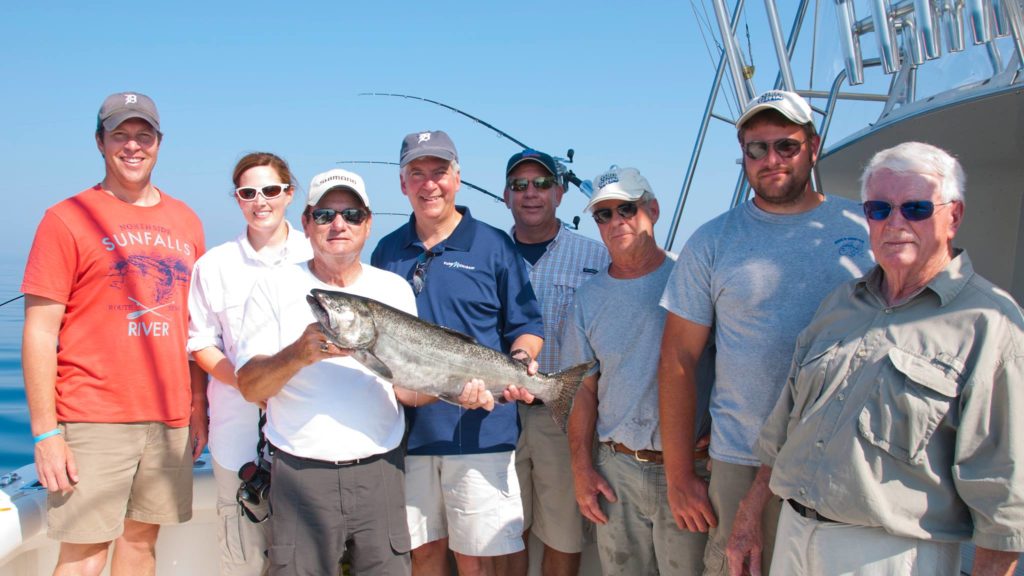
NO FISH-KILLING MICROBEADS IN THE GREAT LAKES, NO EXCEPTIONS
Michigan United Conservation Clubs has been working with the Michigan Salmon and Steelhead Fishermen’s Association to enact a ban on fish-killing microbeads in the Great Lakes. However, the recent legislation proposed to do just such a thing leaves a loophole for undefined “biodegradable” microbeads. Here is our letter in opposition to the legislation:

Re: HB 4345- Plastic in Personal Care Products
Dear Representative Outman and House Committee on Natural Resources,
MUCC believes that effective, transparent, science-based natural resource management is paramount to the collective conservation and recreational opportunities our organization supports for the benefit of future generations. The issue of plastic microbeads in personal care products puts our fisheries and the Great Lakes at risk and this should be addressed, but it is important to consider that the current language in House Bill 4345 does not give us a science-based standard in which to protect our natural resources.
House Bill 4345, as introduced, would phase out and eventually prohibit nonbiodegradable plastic microbeads. We believe the timeline and nature of the phase out is fair and is, in fact, already happening voluntarily. What concerns MUCC is there is no definition of what would continue to be allowed in personal care products—plastic that might be considered “biodegradable.” This legislation lacks a standard to factor in duration, temperature, or fresh water conditions among other aspects to determine the plastic’s biodegradability. Using the term nonbiodegradable without a standard definition presents an unenforceable statute.
As conservation groups and anglers, it is critical to our members that these plastics degrade quickly enough to avoid ingestion by fish and wildlife. If legislation is approved that only phases out nonbiodegradable plastic microbeads without a clear definition of “biodegradable”, it will not result in any meaningful gain to our waterways or protection for our Great Lakes fisheries.
MUCC and its conservation partners have made a good faith effort to work with industry to find consensus on an agreeable science-based definition or a process to determine a definition. Suggestions have included the following:
- Remove the term “nonbiodegradable” from the definition of “plastic microbeads” so that all plastic microbeads will be prohibited, but establish a sunset of this statute to force the examination of the issue at a later date.
- Define biodegradable. This can be done in several different ways in statute:
-
- Put the definition into statute.
- Grant the Michigan Department of Environmental Quality rulemaking authority to develop a definition, which would include researching other definitions used and receiving industry, conservation, and public comment, and be consistent with current law, MCL 324.3109.
- Refer to a national/international standard or law where biodegradable plastic is already defined.
As we understand, research and development continues around biodegradable plastic and the industry wants the flexibility to continue this work to develop products that consumers want to use. By delaying a strict definition (Option 1), but adding in a sunset, this development work can continue so that we will have more concrete information from which to work towards an agreeable definition of biodegradable when the legislation is up for reauthorization. The precedent has already been set by California and Maryland having already passed bills without the reference to “non-biodegradable” plastic microbeads and Maryland gives authority to its DEQ to monitor and define acceptable biodegradable protocol in its waste water treatment facilities. This may also allow time for the proposed federal law and rulemaking process to get underway, which both MUCC and the industry agree is a better approach to have a consistent national standard.
It may be difficult to find consensus at this time to put a definition in statute (Option 2a), as we have not been able to find agreed upon language to date through our informal conversations. This discussion would benefit from study and broader input from scientists, fisheries biologists, and materials experts, which would be possible through rulemaking in Option 2b. References to international standards may work (2c), as there is an ASTM Standard for Non-Floating Biodegradable Plastic (D7081 – 05), which includes a duration, temperature, and water conditions. However, these standards are really created to oversee the marketing of products and false advertising claims when a manufacturer claims a product is biodegradable; language in Michigan statute would have to refer to the standard, but then still specify that these products are prohibited even if not marketed as such.
The Great Lakes commercial, recreational, and tribal fisheries are collectively valued at more than $7 billion annually and support more than 75,000 jobs. In Michigan alone, we have 1.4 million resident anglers and almost 350,000 non-residents who fish Michigan’s 11,000 inland lakes and tens of thousands of miles of rivers, as well as our Great Lakes. Sportfishing is an integral part of Michigan’s ecosystem and economy and as such, it is critical for Michigan to be a leader in developing science-based standards for plastics getting into our waterways. While consistent and strong national standards are preferable, we want our lawmakers to take the necessary actions to protect our waterways and aquatic species as legislators of the “Great Lakes State.”
We hope you will consider our good faith effort to understand and work with industry partners and offer a variety of approaches to get to bill language that will actually accomplish what it should. MUCC asks that you take our recommendations under consideration and we would be happy to review amendments for reconsideration of our position.
Sincerely,
Amy Trotter
Deputy Director
